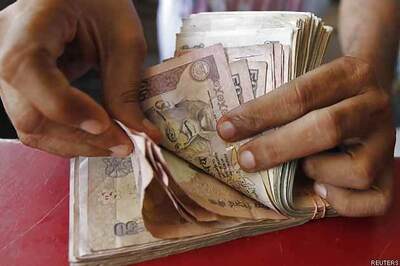
views
SINGAPORE: Singapore’s central bank left its monetary policy unchanged on Wednesday and said its accommodative stance will remain appropriate for some time as the city-state’s economy emerges from its coronavirus slump.
The Monetary Authority of Singapore (MAS) manages policy through exchange rate settings, rather than interest rates, letting the Singapore dollar rise or fall against the currencies of its main trading partners within an undisclosed band.
“As core inflation is expected to stay low, MAS assesses that an accommodative policy stance will remain appropriate for some time,” MAS said in its semi-annual policy statement.
Singapore, whose small and open economy has been hit hard by the COVID-19 pandemic, kept its expectations for full-year gross domestic product (GDP) to shrink 5%-7%.
GDP fell 7% in July-September on a year-on-year basis, compared with a revised 13.3% contraction in the second quarter, preliminary data showed on Wednesday. Economists polled by Reuters had expected a decline of 6.8%.
“Inflation is expected to gradually recover by 2021 and that is going to anchor expectations that MAS will keep policy setting unchanged in 2021,” said Jeff Ng, senior treasury strategist at HL Bank.
The MAS said core inflation will average 0-1% in 2021, while headline inflation is forecast to be between ?0.5 and 0.5%.
Singapore’s main price gauge contracted for the seventh consecutive month in August, with prices falling 0.3% from a year earlier.
The country has spent about S$100 billion, or 20% of its GDP, in virus-related relief to support households and businesses as it battles its worst-ever slowdown.
On a quarter-on-quarter seasonally adjusted basis, GDP grew 7.9%, or an annualised 35.4%. The bounce marked the end of a “technical recession” as it followed two preceding quarterly contractions.
The central bank said, however, that growth is expected to slow in the final quarter of this year and remain modest in 2021, amid cautious external demand and restrictions on crossborder travel.
“The reality is that with continued prospects of anaemic global demand and rising unemployment and bankruptcies at home the recovery is going to be very slow,” ING economist Prakash Sakpal said.
The country has been gradually lifting some of its lockdown measures to reopen its economy in recent months and signalled it wants to slowly resume tourism and travel.
Disclaimer: This post has been auto-published from an agency feed without any modifications to the text and has not been reviewed by an editor
Read all the Latest News and Breaking News here




















Comments
0 comment